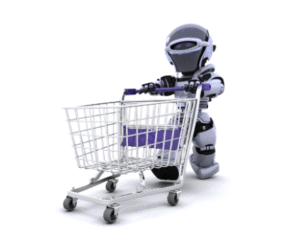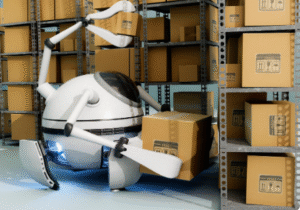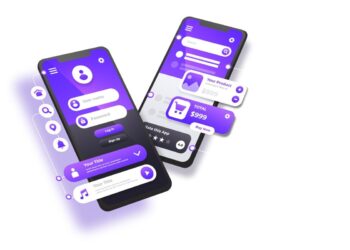Artificial intelligence is revolutionizing how retailers operate, compete, and connect with customers. From AI use cases in retail industry operations to customer-facing innovations, businesses are leveraging retail industry artificial intelligence applications to drive growth and efficiency. Whether you’re exploring AI for retail business operations or considering hiring a retail AI app development company in Dallas, Texas, understanding these transformative use cases is essential for staying competitive in today’s digital marketplace.
Checkout-Free Store Experiences: The Amazon Go Revolution
Amazon Go has redefined the shopping experience by eliminating traditional checkout lines entirely. This powerful AI in retail use case combines computer vision, sensor fusion, and deep learning algorithms to automatically detect when products are taken from or returned to shelves. Customers simply walk in, grab what they need, and leave—their Amazon account is charged automatically.
This checkout-less store technology represents a major breakthrough in retail supply chain AI and customer convenience. Retailers implementing similar AI-powered retail solutions report reduced labor costs, faster shopping experiences, and improved inventory accuracy. For businesses seeking to hire a retail AI app development company in USA, replicating this model requires expertise in machine learning in retail, computer vision, and real-time payment processing.
Virtual Try-On Technology: Sephora’s Beauty Innovation
Sephora’s virtual try-on application showcases how AI Retail Solutions can bridge the gap between online and in-store experiences. Using augmented reality and facial recognition technology powered by Natural Language Processing (NLP) and image analysis, customers can virtually test thousands of makeup products before purchasing.
This iOS AI Retail Solutions and Android AI Retail Solutions technology has dramatically increased conversion rates and reduced product returns. The virtual try-on experience leverages Predictive Analytics to recommend products based on skin tone, preferences, and previous purchases. Fashion and beauty retailers implementing similar generative AI in retail marketing strategies report engagement increases of up to 200% and significant improvements in customer satisfaction scores.

Intelligent Inventory Management: Walmart’s Robotics Revolution
Walmart has deployed thousands of inventory-scanning robots across its stores, demonstrating how retail supply chain AI optimizes operations at scale. These autonomous machines use AI-powered retail solutions to scan shelves, identify out-of-stock items, check pricing accuracy, and detect misplaced products—tasks that previously required dozens of employee hours daily.
This powerful AI in retail use cases delivers real-time inventory visibility, enabling better stock replenishment decisions and reducing lost sales from empty shelves. Target’s supply chain AI implementations have produced similar results, using machine learning algorithms to predict demand patterns and optimize distribution center operations. Retailers exploring AI for retail business operations should prioritize inventory management as a high-ROI starting point.
Conversational AI and Chatbot Customer Service
Chatbot retail customer service has evolved from simple FAQ responders to sophisticated shopping assistants. Modern retail AI chatbots leverage Natural Language Processing (NLP) to understand customer intent, answer complex questions, provide personalized product recommendations, and even complete transactions entirely through conversation.
Major retailers like H&M and Sephora deploy AI chatbots across messaging platforms, mobile apps, and websites, handling millions of customer interactions monthly. These AI use cases in retail industry operations reduce customer service costs by 30-40% while improving response times and availability to 24/7. Shopify’s retail AI tools make this technology accessible even to small businesses through integrated chatbot solutions.
Visual Search: Finding Products Through Images
Visual search retail AI allows customers to snap photos of products they like and instantly find similar items available for purchase. Pinterest Lens, ASOS, and Target have successfully implemented this technology, transforming how customers discover and shop for products.
This powerful AI in retail use cases eliminates the frustration of describing products in words and accelerates the path from inspiration to purchase. Machine learning in retail enables these systems to recognize patterns, colors, styles, and even specific brands within user-uploaded images. The technology is particularly valuable for fashion, home decor, and furniture retailers where visual aesthetics drive purchasing decisions.
Predictive Analytics for Demand Forecasting
Predictive Analytics represents one of the most valuable retail industry artificial intelligence applications for improving profitability. By analyzing historical sales data, seasonal trends, local events, weather patterns, and economic indicators, AI algorithms forecast future demand with remarkable accuracy.
Target’s supply chain AI uses predictive models to optimize inventory levels across thousands of SKUs and store locations, reducing both overstock and stockout situations. This AI for retail business operations capability enables better pricing strategies, promotional planning, and supply chain efficiency. Retailers working with a retail AI app development company in USA can implement custom predictive models tailored to their specific market conditions and product categories.
Personalized Marketing and Recommendation Engines
Generative AI in retail marketing powers hyper-personalized customer experiences across email, mobile apps, and websites. Netflix-style recommendation engines analyze browsing behavior, purchase history, and demographic data to suggest products each customer is most likely to buy.
Amazon’s recommendation engine reportedly drives 35% of total sales, demonstrating the revenue impact of personalized AI Retail Solutions. Shopify’s retail AI tools democratize this technology, enabling smaller retailers to implement sophisticated recommendation systems without massive technology investments. iOS AI Retail Solutions and Android AI Retail Solutions bring these personalized experiences to mobile shoppers, where conversion rates are increasingly concentrated.

Dynamic Pricing Optimization
AI-powered dynamic pricing adjusts product prices in real-time based on demand, competitor pricing, inventory levels, and customer behavior. This retail supply chain AI application maximizes revenue and competitiveness while maintaining customer satisfaction.
Airlines and hotels have used dynamic pricing for decades, but retail adoption has accelerated recently. Walmart and Amazon adjust millions of prices daily using machine learning algorithms. This powerful AI in retail use cases requires careful implementation to avoid customer backlash, making expertise from a retail AI app development company in Dallas, Texas, or other tech hubs valuable for proper execution.
Ready to Transform Your Retail Business with AI?
The AI use cases in retail industry outlined here represent just the beginning of artificial intelligence’s transformative potential. From checkout-less stores to predictive analytics, these retail industry artificial intelligence applications deliver measurable improvements in efficiency, customer satisfaction, and profitability.
Whether you’re exploring iOS AI Retail Solutions, Android AI Retail Solutions, or comprehensive AI for retail business operations, the competitive advantage goes to retailers who act now. Contact expert retail AI app development companies near me or hire a retail AI app development company in USA to develop custom AI-powered retail solutions tailored to your specific business needs. Book a free consultation today to discover how machine learning in retail can revolutionize your operations and drive qualified customer engagement across every digital touchpoint.





